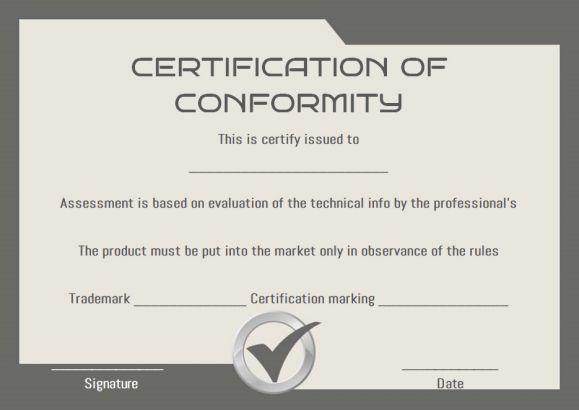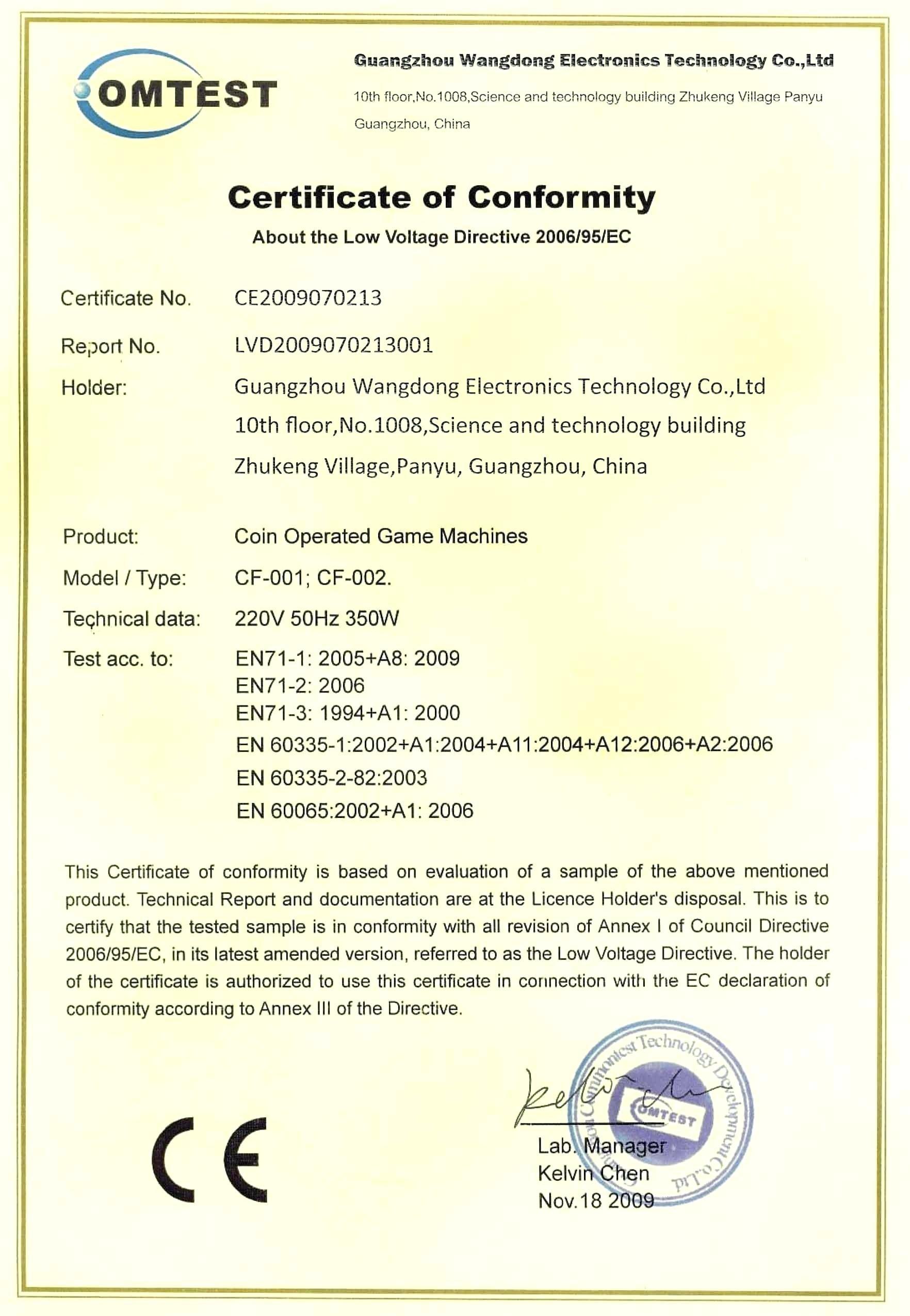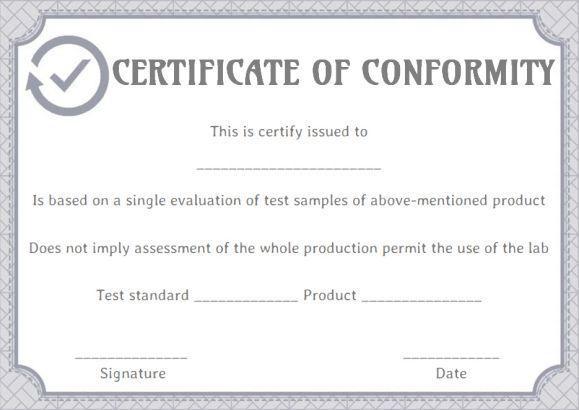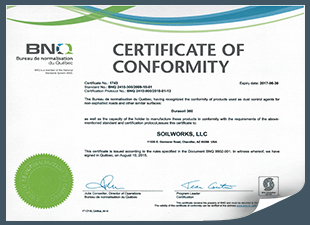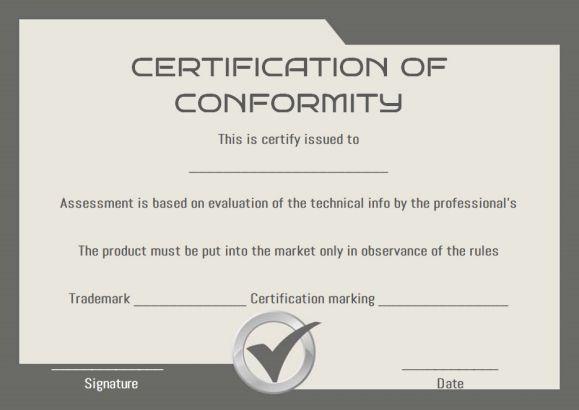A certificate of conformity, also known as a certificate of compliance or a certificate of conformance, is a document that attests to the fact that a product meets certain standards or requirements. These standards or requirements can be related to various aspects of the product, such as its design, materials, manufacturing processes, safety, and performance.
A certificate of conformity is typically issued by a third party, such as a testing laboratory or certification body, that has conducted an assessment of the product and has determined that it meets the relevant standards or requirements. The certificate of conformity serves as evidence of this assessment and can be used by the manufacturer, distributor, or seller of the product to demonstrate to customers, regulators, or other interested parties that the product meets the required standards.
There are many different types of certificates of conformity, and the specific requirements for obtaining one will depend on the type of product and the standards or requirements that it needs to meet. Some common types of certificates of conformity include:
- Quality management system certificates: These certificates attest to the fact that a company’s quality management system meets the requirements of a particular standard, such as the ISO 9001 standard for quality management systems.
- Product safety certificates: These certificates demonstrate that a product meets safety requirements, such as those related to electrical safety, fire safety, or chemical safety.
- Environmental management system certificates: These certificates attest to the fact that a company’s environmental management system meets the requirements of a particular standard, such as the ISO 14001 standard for environmental management systems.
- Product performance certificates: These certificates demonstrate that a product meets certain performance requirements, such as those related to energy efficiency, durability, or reliability.
- EMC (electromagnetic compatibility) certificates: These certificates demonstrate that a product meets requirements related to electromagnetic compatibility, which means that it does not interfere with the operation of other electronic devices and is not adversely affected by electromagnetic fields.
In order to obtain a certificate of conformity, a manufacturer or supplier typically needs to submit a product sample to a testing laboratory or certification body for assessment. The testing laboratory or certification body will then conduct a series of tests or evaluations to determine whether the product meets the relevant standards or requirements. If the product passes these tests, the testing laboratory or certification body will issue a certificate of conformity.
There are several benefits to obtaining a certificate of conformity. For manufacturers and suppliers, a certificate of conformity can serve as a marketing tool, as it provides evidence that the product meets certain standards or requirements, which can be attractive to customers. A certificate of conformity can also help a manufacturer or supplier to meet regulatory requirements and to comply with industry standards.
For customers, a certificate of conformity can provide assurance that a product meets certain standards or requirements, which can be important in terms of safety, performance, and quality. A certificate of conformity can also help customers to make informed purchasing decisions and to choose products that are suitable for their needs.
In summary, a certificate of conformity is a document that attests to the fact that a product meets certain standards or requirements. It is typically issued by a third party, such as a testing laboratory or certification body, and can be used by the manufacturer, distributor, or seller of the product to demonstrate to customers, regulators, or other interested parties that the product meets the required standards. There are many different types of certificates of conformity, and the specific requirements for obtaining one will depend on the type of product and the standards or requirements that it needs to meet. Obtaining a certificate of conformity can provide several benefits for manufacturers and suppliers, as well as for customers.
What Is The Difference Between a Declaration Of Conformity And a Certificate Of Conformity?
A declaration of conformity and a certificate of conformity are both documents that attest to the fact that a product meets certain standards or requirements. However, there are some key differences between these two types of documents.
A declaration of conformity is a statement made by a manufacturer or supplier that a product conforms to a particular standard or requirement. It is typically a self-declaration, meaning that the manufacturer or supplier is making the statement without the involvement of a third party. A declaration of conformity is typically provided along with the product, and it may be required by law or industry regulations in certain circumstances.
A certificate of conformity, on the other hand, is a document issued by a third party, such as a testing laboratory or certification body, that attests to the fact that a product meets a particular standard or requirement. The third party has conducted an assessment of the product and has determined that it meets the relevant standards or requirements. A certificate of conformity serves as evidence of this assessment and can be used by the manufacturer, distributor, or seller of the product to demonstrate to customers, regulators, or other interested parties that the product meets the required standards.
In summary, the main difference between a declaration of conformity and a certificate of conformity is that a declaration of conformity is a statement made by the manufacturer or supplier, while a certificate of conformity is a document issued by a third party. A declaration of conformity is a self-declaration, while a certificate of conformity is based on an assessment conducted by a third party.
What Is The Difference Between a Certificate Of Conformity And a Certificate Of Compliance?
A certificate of conformity and a certificate of compliance are both documents that attest to the fact that a product meets certain standards or requirements. However, there are some subtle differences between these two types of documents.
A certificate of conformity is a document that attests to the fact that a product meets a particular standard or requirement. It is typically issued by a third party, such as a testing laboratory or certification body, that has conducted an assessment of the product and has determined that it meets the relevant standards or requirements. A certificate of conformity serves as evidence of this assessment and can be used by the manufacturer, distributor, or seller of the product to demonstrate to customers, regulators, or other interested parties that the product meets the required standards.
A certificate of compliance is similar to a certificate of conformity, but it specifically refers to the fact that a product complies with a particular standard or requirement. The term “compliance” suggests that the product is in accordance with a particular set of rules or regulations, whereas the term “conformity” suggests that the product meets a particular standard or specification.
In summary, the main difference between a certificate of conformity and a certificate of compliance is the use of the word “compliance” in the latter, which suggests that the product is in accordance with a particular set of rules or regulations. Both types of documents are used to attest to the fact that a product meets certain standards or requirements, and they may be issued by a third party, such as a testing laboratory or certification body, based on an assessment of the product.
What Is The Difference Between a CE Certificate And a Declaration Of Conformity?
CE (Conformité Européene) is a certification mark that is used to indicate that a product meets the essential requirements of European Union (EU) legislation. It is used to demonstrate that a product is safe, performs as expected, and is in compliance with EU regulations.
A CE certificate is a document that attests to the fact that a product has been assessed and found to meet the relevant requirements for CE marking. It is typically issued by a third party, such as a testing laboratory or certification body, that has conducted an assessment of the product and has determined that it meets the relevant standards or requirements. A CE certificate serves as evidence of this assessment and can be used by the manufacturer, distributor, or seller of the product to demonstrate to customers, regulators, or other interested parties that the product meets the required standards.
A declaration of conformity is a statement made by a manufacturer or supplier that a product conforms to a particular standard or requirement. It is typically a self-declaration, meaning that the manufacturer or supplier is making the statement without the involvement of a third party. A declaration of conformity is typically provided along with the product, and it may be required by law or industry regulations in certain circumstances.
In summary, the main difference between a CE certificate and a declaration of conformity is that a CE certificate is a document issued by a third party, such as a testing laboratory or certification body, that attests to the fact that a product meets the requirements for CE marking, while a declaration of conformity is a statement made by the manufacturer or supplier that the product conforms to a particular standard or requirement. A CE certificate is based on an assessment conducted by a third party, while a declaration of conformity is a self-declaration.
